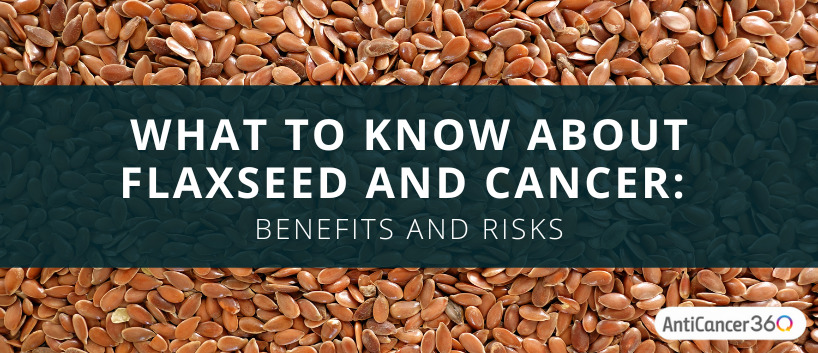Besides following your oncologist’s treatment plan, you may wonder what else you can do to fight cancer. It can be difficult to figure out what diet and exercise routine to follow and whether or not you should add dietary supplements.
For the health-conscious, and especially when you’re fighting cancer, it’s common to have questions about what to avoid—and what to eat—in your daily life to support your body.
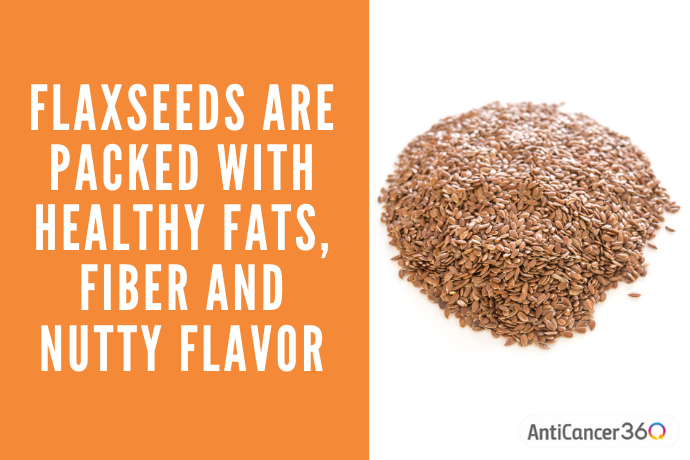
Flaxseed is a natural source of dietary fiber and healthy fats. It has become a popular “health food” due to what research has found in various disease states, including heart disease, digestive conditions, and cancer.
In today’s post, we’ll talk about flaxseed and the evidence behind its anticancer effects. Keep reading for more information about flaxseed, how to take it, and how this functional food may help in your fight against cancer.
What is Flaxseed?
Flaxseed, also known as linseed, comes from the flax plant, Linum usitatissimum, and is commonly found in foods such as bread and oatmeal. These nutty-tasting seeds can be eaten whole or ground, or they can be cold-pressed to produce flaxseed oil. Powders, tablets, and other ready-to-use forms are also available as dietary supplements [1].
Anticancer Potential of Flaxseed
Flaxseed consumption may reduce the risk of numerous cancers such as breast, prostate, colon, and hormone-related cancers [2]. A growing number of research studies show that flaxseed can kill certain types of cancer cells. Flaxseed contains several bioactive components, including lignans and peptides called linusorbs. Additionally, flaxseed is a source of alpha-linolenic acid and omega-3 fatty acids [3].
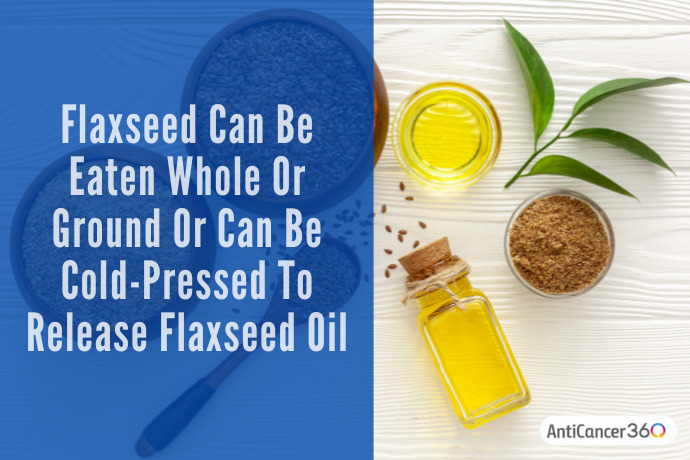
Linusorbs have been shown to inhibit or block cancer cells from absorbing the essential nutrients they need to live, thus causing cellular death [4],[5]. Flaxseed linusorbs have also been shown to kill cancerous cells in human lung epithelial carcinoma, a type of lung cancer.2 Both human and animal models have shown that flaxseed benefits colorectal cancer, showing a decrease in cancerous neoplasms in the colon. These studies have also demonstrated flaxseed’s potential to aid in the regulation of cell growth and development [6].
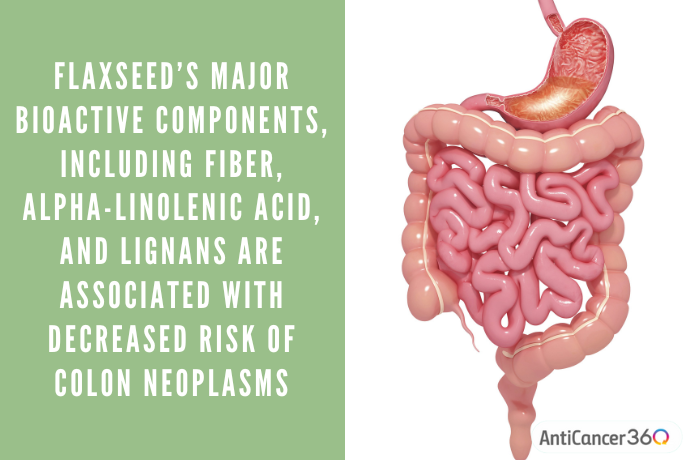
Research shows that flaxseed is generally safe and may be beneficial in people with breast cancer. Consuming flaxseed may reduce the proliferation and nuclear transformation of cells within the breast tissue, specifically the mammary glands [7].
Preliminary studies in animals and human cells have shown promising results. For example, one study found that flaxseed may reduce the risk of growth of breast cancer when used in rats [8]. In another study, daily feedings that contained 5 to 10% of flaxseed were associated with suppressed growth of estrogen-receptor positive and negative (ER+ and ER-) breast cancer cells in mice [9].
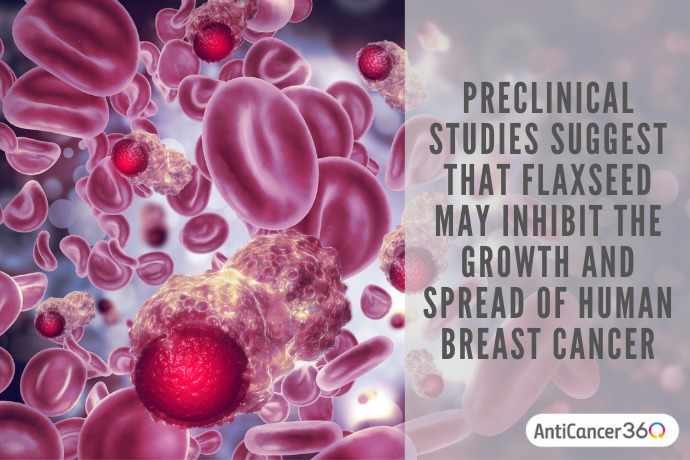
More data is needed to confirm the benefits of flaxseed in breast cancer in humans. Also, since some evidence shows that flaxseed has estrogen-like effects, people with estrogen receptor positive (ER+) breast cancer should check with their physician before using it as a supplement.
Frequently Asked Questions About Flaxseed and Cancer
Next, we’ll answer some commonly asked questions about flaxseed and cancer.
Which form of flaxseed is the best?
Flaxseed is available in many different forms: whole, ground, oils, etc. Many clinicians recommend ground flaxseed because it is easier for the stomach to digest. If you opt for whole flaxseed, there is a possibility that the seed will pass through your gastrointestinal tract without getting absorbed, so it may not be beneficial [10].
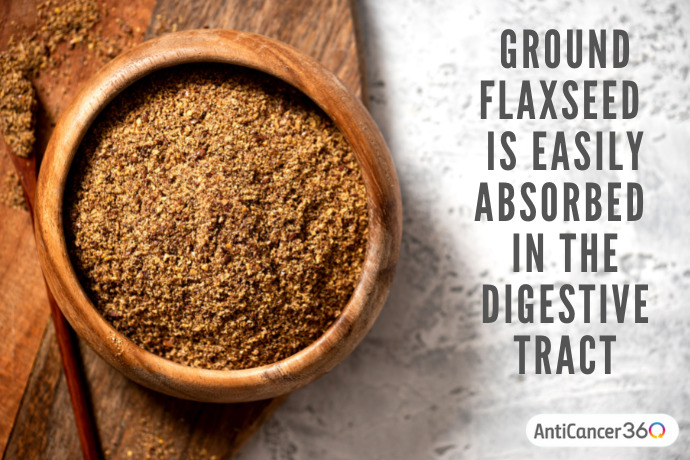
In a study looking at flaxseed in people with diabetes, ground flaxseed was the most effective form of flaxseed [11]. These results suggest that ground flaxseed is readily digestible and quickly utilized in the body.
Is it safe to consume flaxseed while taking tamoxifen?
Tamoxifen is a prescription drug used to treat breast cancer. There are no known drug interactions between tamoxifen and flaxseed [12].
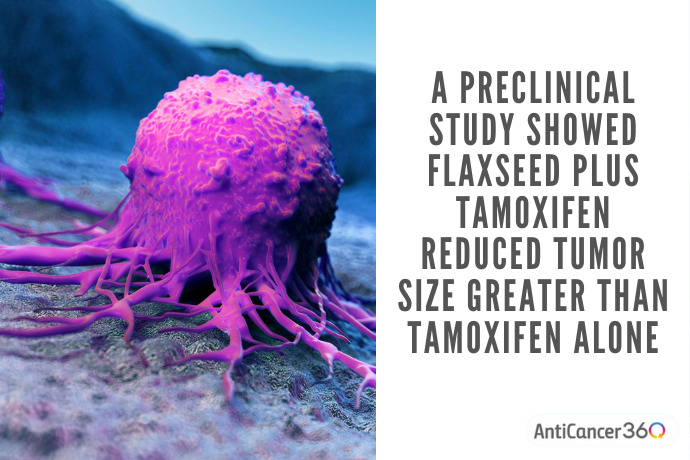
In fact, in animal studies, the combination of flaxseed plus tamoxifen reduced the size of tumors greater than tamoxifen alone [13]. One study at the University of Toronto found that tumors in mice were inhibited by 53% when treated with flaxseed plus tamoxifen, compared to tamoxifen alone [14]. However, these studies haven’t yet been replicated in humans.
Are there any side effects of flaxseed?
Most people do not experience side effects from occasionally eating flaxseed as part of their diet. Possible side effects of flaxseed supplementation may include [15]:
- Stomach upset, such as:
- Diarrhea
- Constipation
- Bloating
- Flatulence
- Nausea
Talk to your care provider if you think flaxseed may be causing stomach upset. They may recommend trying a different form of flaxseed, or adjusting the time of day, dose, or timing of other foods or medicines to see if your symptoms improve.

Taking flaxseed in moderation shouldn’t carry risks. However, some people may have an allergic reaction after consuming flaxseed. If you notice a rash or trouble breathing after taking flaxseed or flaxseed oil, seek medical attention immediately. Also, it isn’t clear whether flaxseed supplementation is safe for those who are pregnancy or breastfeeding [16],[17],[18]. As a precaution, it’s best to consult a healthcare professional before starting any new supplement, including flaxseed,especially currently being treated for other conditions.
How much flaxseed should I take?
It’s best to talk to a integrative cancer specialist for personalized dosing of dietary supplements. A typical serving size of flaxseed is two tablespoons (about 30 grams) [19]. You can grind flaxseeds at home using a spice grinder or a mortar and pestle. Then you can sprinkle the ground seed on salads, oatmeal, yogurt, smoothie bowls, peanut butter, or other sandwich spreads.
If you use flaxseed oil, you’ll take one to two tablespoons to meet the daily ALA recommendation. Consider drizzling the oil over a salad or use it as veggie dip [20].
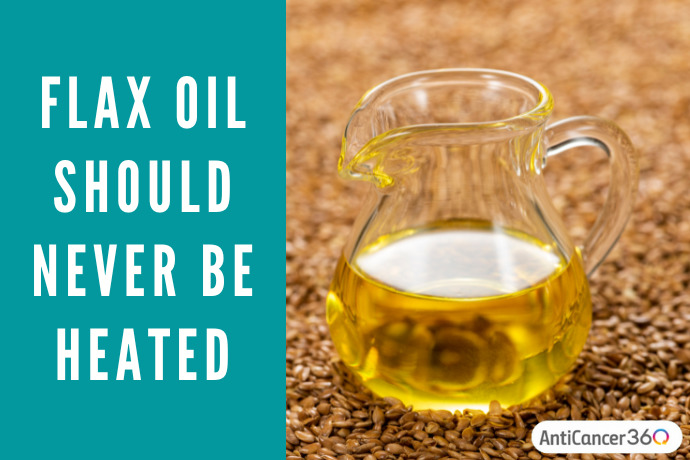
If you use flaxseed tablets, powder, or capsules, follow the directions on the label. The instructions vary with the product, but it’s usually recommended to take with food and plenty of water to help minimize stomach upset.
Health Benefits of Flaxseed and Flaxseed Oil When Fighting Cancer
When you’re fighting cancer, it’s essential to support your entire body and overall health, including managing medical conditions and protecting body systems not directly affected by your cancer. Flaxseed plays a beneficial role in:
- Cardiovascular health. Flaxseed may provide benefits in people with cardiovascular diseases, such as high blood pressure and high cholesterol [21]. In people with type 2 diabetes with cardiovascular risks, flaxseed may help to lower serum lipoprotein (a type of protein that transports cholesterol) and also lower blood pressure [22].
- Diabetes. Preclinical studies of flaxseed have shown blood sugar-lowering effects in animals with type 1 diabetes [23]. Another study in animal models found that flaxseed may also delay type 2 diabetes while also improving glycemic control [24]. In addition, a meta-analysis found that consuming flaxseed improves fasting blood sugar levels, average blood sugar levels (as measured by a blood test called A1C), and insulin levels in people with pre-diabetes or type two diabetes mellitus [25].
- Menopause. Studies have noted a decrease in menopausal symptoms in women, such as hot flashes, when flaxseed was consumed as a daily supplement [26].
- Skin health. Flaxseed use has been linked to improved skin hydration and smoothing [27]. It has also demonstrated anti-aging and skin preservation benefits [28].
Flaxseed oil also has specific demonstrated health benefits that are important while fighting cancer, such as:
- Reducing inflammation [29]
- Preventing constipation and improves digestion [30]
- Maintaining healthy skin, your body’s first barrier against infections and toxins [31]
Bottom Line
Overall, you can see that there can be many potential benefits to adding flaxseed to your daily routine. And when you’re fighting cancer, you want to take full advantage of every possible anticancer, including a healthy diet.
Be sure to consult a member of your healthcare team before starting a flaxseed supplement. They can also help advise you and answer any questions about your unique situation and whether flaxseed is right for you.
Ultimately, when using an “Aggressive Integrative Approach” to cancer, the goal is to design a plan and lifestyle that fights your cancer from every direction. This approach includes integrating anticancer dietary supplements in a way that complements your oncology treatment plan.
If you’d like to know more about the AntiCancer360 approach and see if we can help you, please watch our free online webinar to learn more. Then at the end, you’ll be able to schedule a free call with someone from our team so that we can discuss your case in more detail and answer any questions that you have.
Are you a flaxseed fan? What is your favorite way to add it to your diet? Would you like to share your tips with our community? Please let us know in the comments below!
Dr. Patricia Weiser is one of AntiCancer360’s consultant pharmacists, science advisors, and medical writers. Her expertise helps us create safe herbal and supplement combinations and avoid potential drug interactions.
Patricia is a graduate of the University of Pittsburgh and a licensed pharmacist. She has clinical experience in both community and hospital pharmacy. She is passionate about integrative and preventative care and strives to empower her patients to take an active role in their health.

